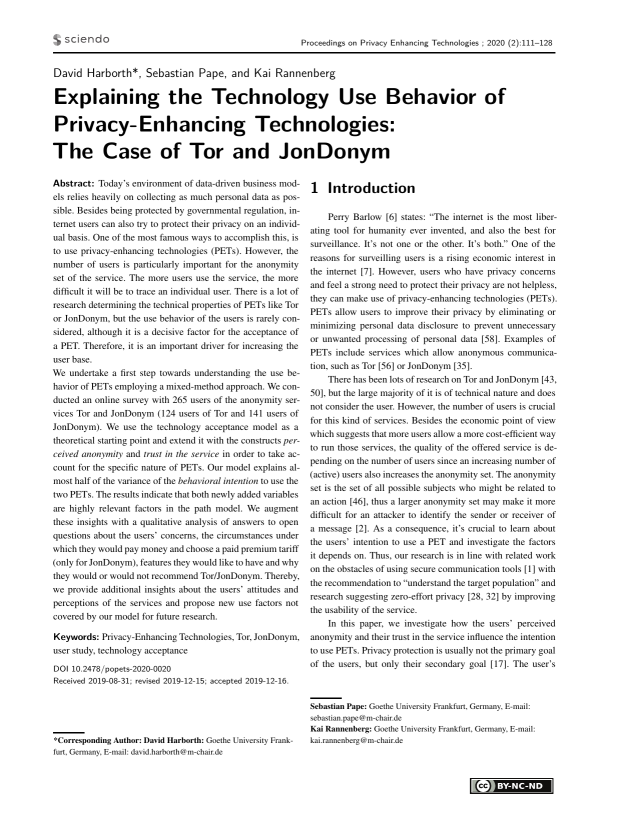Explaining the Technology Use Behavior of Privacy-Enhancing Technologies: The Case of Tor and JonDonym
Authors: David Harborth (Goethe University Frankfurt, Germany), Sebastian Pape (Goethe University Frankfurt, Germany), Kai Rannenberg (Goethe University Frankfurt, Germany)
Volume: 2020
Issue: 2
Pages: 111–128
DOI: https://doi.org/10.2478/popets-2020-0020
Abstract: Today’s environment of data-driven business models relies heavily on collecting as much personal data as possible. Besides being protected by governmental regulation, internet users can also try to protect their privacy on an individual basis. One of the most famous ways to accomplish this, is to use privacy-enhancing technologies (PETs). However, the number of users is particularly important for the anonymity set of the service. The more users use the service, the more difficult it will be to trace an individual user. There is a lot of research determining the technical properties of PETs like Tor or JonDonym, but the use behavior of the users is rarely considered, although it is a decisive factor for the acceptance of a PET. Therefore, it is an important driver for increasing the user base. We undertake a first step towards understanding the use behavior of PETs employing a mixed-method approach. We conducted an online survey with 265 users of the anonymity services Tor and JonDonym (124 users of Tor and 141 users of JonDonym). We use the technology acceptance model as a theoretical starting point and extend it with the constructs perceived anonymity and trust in the service in order to take account for the specific nature of PETs. Our model explains almost half of the variance of the behavioral intention to use the two PETs. The results indicate that both newly added variables are highly relevant factors in the path model. We augment these insights with a qualitative analysis of answers to open questions about the users’ concerns, the circumstances under which they would pay money and choose a paid premium tariff (only for JonDonym), features they would like to have and why they would or would not recommend Tor/JonDonym. Thereby, we provide additional insights about the users’ attitudes and perceptions of the services and propose new use factors not covered by our model for future research.
Keywords: Privacy-Enhancing Technologies, Tor, JonDonym, user study, technology acceptance
Copyright in PoPETs articles are held by their authors. This article is published under a Creative Commons Attribution-NonCommercial-NoDerivs 3.0 license.


